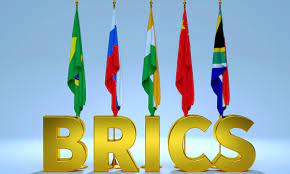
The NDB in Action
By Mohamed Al-Kazzaz
Vladimir Kazbekov, the vice President and CEO of the New Development Bank (NDB), was in Cairo to launch the bank’s operations in Egypt.
Established in 2015 by the BRICS group of countries consisting of Brazil, Russia, India, China and South Africa, the NDB is a multilateral development bank aimed at mobilising resources for infrastructure and sustainable development projects.
Egypt was admitted as a member of the BRICS group as part of a move to expand its membership. Minister of Finance Mohamed Maait was appointed the country’s governor on the bank’s board.
Kazbekov was in Cairo to build a strong portfolio of projects funded by the NDB in both the sovereign (governmental) and non-sovereign (private) sectors. His meetings with Egyptian officials and private-sector business leaders aimed to discuss the possible roles the NDB can play in financing infrastructure, transport, renewable energy, and sustainable development projects in Egypt.
His visit coincided with the coming into force of Egypt’s membership of the BRICS in January this year. It was invited to join the grouping in August during the BRICS Summit meeting in South Africa.
Kazbekov met with several ministers, including the ministers of finance and international cooperation, electricity, and energy and transport, as well as the governor of the Central Bank and the heads of the National Bank of Egypt and Banque Misr. He also met with the heads of some private-sector firms.
One of his goals during the visit was “to have at least one project approved by the bank. The Decent Life initiative is one of the projects being considered, under which the NDB could provide the financing for constructing hospitals and purchasing medical equipment,” Kazbekov said.
“It would be good to start with large and widely beneficial sovereign [government] projects such as the Decent Life initiative,” he said, adding that “I want the NDB to complete the work on this project during this year and then move on to other projects in energy, transport and other sectors.”
Kazbekov undertook field visits to get a first-hand impression of different projects in different parts of the country. Egypt has made strong progress in areas like green hydrogen, he noted, and he was also impressed by the Suez Canal Economic Zone.
“It is a very interesting supply chain project, which provides for the active participation of member countries such as China and Russia in designated sections of this zone,” he said.
He also offered encouraging predictions for the Egyptian economy, which “will experience further growth in the future once the credit rating improves and the currency stabilises.”
He took notice of Egypt’s extensive road network and New Administrative Capital. “Such infrastructure makes it easier to come up with and carry out good projects to achieve growth,” he said.
The government is keen to invest in infrastructure projects, and this is important to the bank, whose core mission is to promote the realisation of the UN Sustainable Development Goals (SDGs), which include transportation, green energy, and sustainable infrastructure.
One of the objectives of the bank and the BRICS group is to develop a global governance model and to launch a common currency to strengthen its influence and status as a leading global force.
“We are thinking of increasing the use of local currencies in our operations. There may be a currency for the BRICS countries in the future, but this is not a process led by the NDB,” Kazbekov said, adding that the bank “will continue to boost financing in local currencies, as we have been doing since the outset.”
Egypt relies on the NDB to finance a number of projects in line with the bank’s strategy to increase its project portfolio in the country. Currently, the NDB has a project portfolio of $34 billion for all member countries, Kazbekov said. This year its goal is to increase the bank’s total financing approvals by another $4 billion to $6 billion. However, there are specific goals and targets within this framework.
“We need to keep our financing of climate action and the green economy at 40 per cent of the overall project portfolio,” Kazbekov said. The bank intends to increase financing to the private sector from the current 14 per cent of the total portfolio to 30 per cent by 2026.
“We hope to continue on this trajectory, as it is preferable to develop private-sector business and investment,” Kazbekov said.
He pointed out that the NDB has to raise the funding for each of the projects it approves. It is keen for its operations to align with the SDGs in keeping with its commitment to sustainability and optimum development impacts.
“We believe that achieving the SDGs requires a financing framework that effectively mobilises resources from diverse sources, especially from the private sector,” he said.
Most of the projects supported by the bank contribute directly to enabling member states to attain their SDG targets in accordance with their national development plans and their commitments under the 2015 Paris Climate Agreement.
The NDB prioritises high-impact operations that are climate smart, resilient to shocks, technologically integrated, and socially inclusive, Kazbekov said. ____
Al-Ahram Weekly
Source: english.ahram.org.eg
